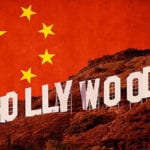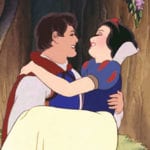 Our World
Our World  Our World
Our World  Pop Culture
Pop Culture 10 Incredible Female Comic Book Artists
 Crime
Crime 10 Terrifying Serial Killers from Centuries Ago
 Technology
Technology 10 Hilariously Over-Engineered Solutions to Simple Problems
 Miscellaneous
Miscellaneous 10 Ironic News Stories Straight out of an Alanis Morissette Song
 Politics
Politics 10 Lesser-Known Far-Right Groups of the 21st Century
 History
History Ten Revealing Facts about Daily Domestic Life in the Old West
 Weird Stuff
Weird Stuff 10 Everyday Products Surprisingly Made by Inmates
 Movies and TV
Movies and TV 10 Actors Dragged out of Retirement for One Key Role
 Creepy
Creepy 10 Lesser-Known Shapeshifter Legends from Around the World
 Our World
Our World 10 Science Facts That Will Change How You Look at the World
 Pop Culture
Pop Culture 10 Incredible Female Comic Book Artists
 Crime
Crime 10 Terrifying Serial Killers from Centuries Ago
Who's Behind Listverse?

Jamie Frater
Head Editor
Jamie founded Listverse due to an insatiable desire to share fascinating, obscure, and bizarre facts. He has been a guest speaker on numerous national radio and television stations and is a five time published author.
More About Us Technology
Technology 10 Hilariously Over-Engineered Solutions to Simple Problems
 Miscellaneous
Miscellaneous 10 Ironic News Stories Straight out of an Alanis Morissette Song
 Politics
Politics 10 Lesser-Known Far-Right Groups of the 21st Century
 History
History Ten Revealing Facts about Daily Domestic Life in the Old West
 Weird Stuff
Weird Stuff 10 Everyday Products Surprisingly Made by Inmates
 Movies and TV
Movies and TV 10 Actors Dragged out of Retirement for One Key Role
 Creepy
Creepy 10 Lesser-Known Shapeshifter Legends from Around the World
10 Hollywood Films Altered To Appease China
In 2012, China officially surpassed Japan to become the second-largest market for Hollywood movies. The world’s most populous nation has displayed an ever growing appetite for American films, leading some trend analysts to conclude that the People’s Republic will surpass the North American market in 2018 to become the largest box office in the world.
Film studios have been eager to capitalize on the staggering profit potential of the Chinese market, going as far as to retool their products to appease the notoriously picky Chinese censors. Censorship of Hollywood films in foreign markets isn’t new, but never before have filmmakers been so willing to dilute their own movies to better fit with the vaguely defined government restrictions imposed on films released in China.
10 Iron Man 3
In a 2014 speech, China’s President Xi Jinping reaffirmed the Mao Zedong decree that Chinese art should “serve politics.” This led The New York Times to speculate that the four minutes of added footage in the Chinese release of Iron Man 3 had more to do with pacifying the public than making the film more palatable for a Chinese audience.
A year before the Marvel release, a major dairy firm in China recalled a shipment of baby formula after it was contaminated with mercury. A similar incident in 2008 led to the deaths of six infants and left over 300,000 ill.
After the recall, Chinese parent began flocking to Hong Kong to buy formula, due to fears of the quality of domestic dairy. Under pressure from the sudden influx of Chinese parents, Hong Kong was forced to issue a two-tin baby formula export limit.
So what does this have to do with Tony Stark? Well, in the Chinese version of Iron Man 3, a question is put to the audience during the film’s opening. “What does Iron Man rely on to revitalize his energy?” The answer, revealed by three prominent Chinese actors, is Gu Li Duo, a milk drink found all over mainland China. The added scenes also show a Chinese doctor prepping for surgery by gulping down the affordable beverage.
The New York Times saw the added scenes as a brazen attempt to ease public fears over the quality of domestic milk. But whatever the reason, the extra scenes were largely panned by Chinese bloggers. They criticized the Gu Li Duo plug, along with the myriad of other Chinese product placements jammed into the four additional minutes.
9 Pixels And World War Z
![]()
In an effort to gain access to the huge Chinese market, filmmakers have become very cautious in how they present China in their movies. To avoid offending the Chinese government (who are extremely touchy about how their country is displayed on-screen), studios have begun to self-censor any movies that make even the most innocuous reference to China.
For example, in 2015, Sony executives scrubbed out scenes in Pixels that showed the Great Wall of China being destroyed. Another scene that mentioned China as a potential hacking threat was also removed. Interestingly, the film was partially financed by China Film Group, the state-owned agency that determines which foreign films are shown in Chinese theaters. In other words, Pixels was guaranteed a Chinese release, which probably explains Sony’s caution in approaching the script.
Similarly, Universal Studio’s zombie pandemic film, World War Z, also underwent script tweaks in the hopes of being granted a coveted Chinese release. A line of dialogue that made reference to the zombie plague originating in China was removed from the final cut. But the filmmakers needn’t have bothered. World War Z, even with the removed dialogue, was rejected by Chinese censors and was never released in mainland China.
8 Django Unchained
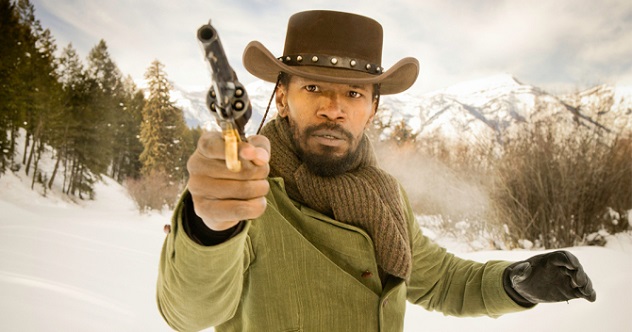
Director Quentin Tarantino has developed a tempestuous relationship with China over the course of his career. Before Django Unchained, none of his films were ever granted an official release.
Unlike the US, China doesn’t impose an age-restriction rating system. That means every film is technically open to all ages. It’s surprising then that Django Unchained was granted a release date at all, considering Tarantino’s penchant for stylized violence.
But for this particular film, Tarantino agreed to tone down the violence by reducing the blood splatter effects and making the blood a darker shade of red. However, after weeks of heavy promotion, Django Unchained was pulled from Chinese cinemas on the day of its release, with Chinese movie officials citing “technical problems.”
A month later, Django Unchained was finally released after Chinese censors removed a handful of scenes. Crucially, the bloody finale underwent major cuts so the film could be approved for release. And in one last stroke of misfortune for Mr. Tarantino, his homage to classic westerns was treated with relative indifference by the Chinese public. Django Unchained flopped in China.
The Django Unchained debacle wasn’t the only time a film involving Tarantino faced the scorn of Chinese censors. In 2012, the director lent his name as “presenter” to The Man with the Iron Fists, a martial arts flick. At first, the film was granted permission to film in China after authorities reviewed the script. (To ensure permission, the producers refused to cast a particular actor whom the authorities disapproved of.) But in spite of the filmmakers’ cooperation, The Man with the Iron Fists was denied a Chinese release for reasons that were never explained.
7 RoboCop And The Hunger Games
In 2012, China increased the number of foreign films allowed to be shown in Chinese cinemas from 20 to 34, stipulating these extra 14 must be presented in either IMAX or 3-D. In the intervening years, Hollywood studios have scrambled to convert 2-D films into 3-D specially for the Chinese market.
To ensure the release of their 2014 remake of RoboCop, Sony executives proved unwilling to retain scenes they considered vital to the plot in the face of Chinese objections. One such scene depicted the RoboCop character having his armor removed to reveal his few remaining body parts. This was considered too disturbing for Chinese audiences. In a telling email exchange, a Sony executive mentioned that too much money was on the line to insist the scene be retained. This resulted in Sony releasing a special 3-D version that was only viewed in China.
Similarly, The Hunger Games: Mockingjay–Part I received its own 3-D conversion for the Chinese market. And as for the final installment, Lionsgate released a 3-D version of Mockingjay–Part 2 in China and other foreign territories, but the film was only released in 2-D in the US. This decision adds weight to the assertion that the 3-D trend in America is over, and that Hollywood films made in 3-D are now intended for international audiences.
6 Looper
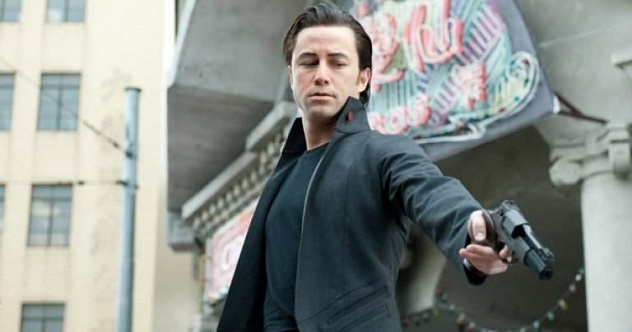
One way to circumvent China’s “34-film” rule is to seek co-production status. This means a Chinese company co-finances the movie and has direct input into the production. Being granted co-production status not only guarantees the film a Chinese release date, but the feature can also be shown during the blackout phase of the Chinese film calendar. (This is a period when imported films are forbidden, thus giving Chinese features an advantage.)
This was the case with 2012’s Looper, a film which had 40 percent of its reported $60 million budget provided by DMG, a China-based media company. But the path to co-production status was not without its problems. Filming locations were changed from Paris to Shanghai when DMG was brought on as a financier. Additionally, a prominent Chinese actress was cast in a major role to make the film more “China-centric.”
After weeks of heavy promotion—which isn’t usually afforded to Western movies—Looper still hadn’t been officially granted co-production status. In what must have felt like a blow to the movie’s ambitions, Zhang Peiming (then deputy bureau chief of the State Administration of Radio, Film, and Television) signaled out Looper in a statement where he criticized productions that only made superficial changes to get around the quota system. According to Zhang, these movies hurt the box office of Chinese films.
A week before Looper’s release, Chinese authorities announced that the film had been granted “assisted co-production status.” It’s a puzzling label, but nevertheless, an extended cut that featured more Chinese content was finally allowed to play in the People’s Republic.
5 The Karate Kid
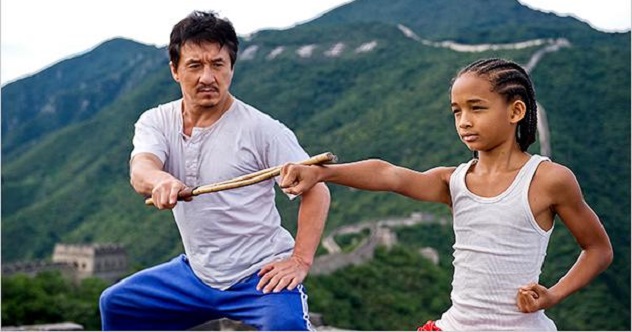
As Looper proved, being bestowed with the label of “co-production” doesn’t necessarily guarantee a smooth journey to Chinese cinemas. That’s a lesson the 2010 remake of The Karate Kid learned the hard way.
Made in conjunction with China Film Group, the movie was released in China under the title The Kung Fu Kid. After all, kung fu is a Chinese martial art, while karate hails from neighboring Japan.
Filmed entirely in China, The Karate Kid was shot using a China-sanctioned script, but the finished film still ran afoul of the Chinese censors. After the movie’s completion, The Karate Kid’s initial request for Chinese distribution was rejected due to the portrayal of a Chinese character as the movie’s principal antagonist. This led to a delay in the release date and the removal of 12 minutes from the original cut.
More specifically, the Chinese version removed scenes where Chinse children bully the American hero without provocation. Instead, the Chinese version only shows fights where Jaden Smith’s character seems to be the aggressor. Scenes depicting a rival kung fu teacher as the main villain were also removed.
An American reviewer living in China commented that the changes essentially altered the movie from a standard tale of an underdog defeating his persecutors to the story of an angry American who goes on a journey of self-discovery and finds peace through traditional Chinese martial arts.
4 Southpaw
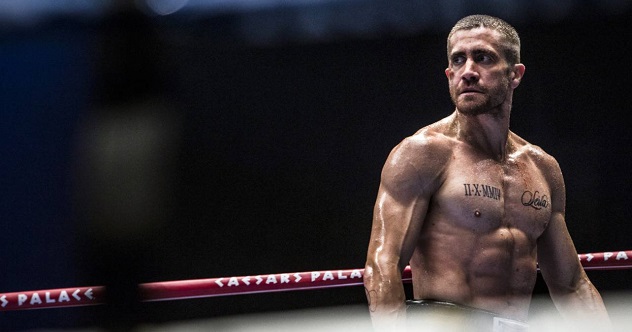
If any movie illustrates the ever-deepening relationship between China and Hollywood, it’s surely the 2015 sports drama Southpaw. This film has the honor of being the first American film to have its entire production budget financed by a Chinese company.
The Wanda Group, a commercial property giant in China, put up the $25 million production budget. Then the Weinstein Company, an American studio, produced the film and paid a further $35 million to market the movie.
Not content with just being a silent partner, the Wanda Group was a large presence throughout all phases of the movie’s production. Weinstein president David Glasser claimed that Wanda representatives “were on the set and involved in production, post-production, marketing, everything.” Glasser went on to state that the Wanda Group wanted to learn how Hollywood studios made films.
The Southpaw experience looks to have been dress rehearsal for the Wanda Group, a company with ambitions that have proven to be much larger than just financing the occasional Hollywood feature. The conglomerate bought the Hollywood studio Legendary for a cool $3.5 billion in early 2016.
3 Maleficent
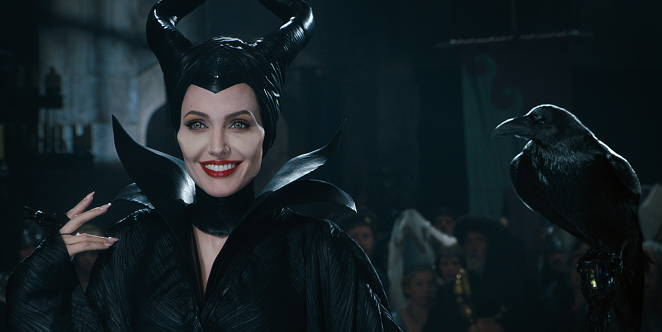
Even the seemingly straightforward task of promoting a film in China can be fraught with unforeseen complications, as proven by Disney’s Maleficent.
During a round of media interviews in Shanghai to promote the film, Maleficent’s star, Angelina Jolie, was asked who her favorite Chinese director was. The actress stated that she admired the work of Ang Lee, adding that she wasn’t sure if Lee was considered Chinese as he was born in Taiwan.
Tension has existed between Taiwan and China since 1949. After being defeated by the Communist Party in the Chinese Civil War, the Nationalists set up a rival government on the nearby island. The relationship between the two has improved in recent years, but China still sees Taiwan as a renegade province and hasn’t ruled out using military force to retake the island.
Jolie’s innocent comments created a sensation among Chinese Internet users who criticized her for implying Taiwan and China are two separate countries. In one particularly zealous comment, Jolie was called a “deranged Taiwan independence supporter.”
Concerned that the negative publicity could hurt the film’s Chinese box office, Disney organized a special publicity stunt where Jolie, along with her famous husband and family, shared a birthday cake with crowds in Shanghai. The Jolie-Pitt’s also took a lesson in making dim sum. All this extra publicity helped Maleficent pull in a healthy $22 million. That’s not bad for a film starring a deranged Taiwan independence supporter.
2 21 And Over
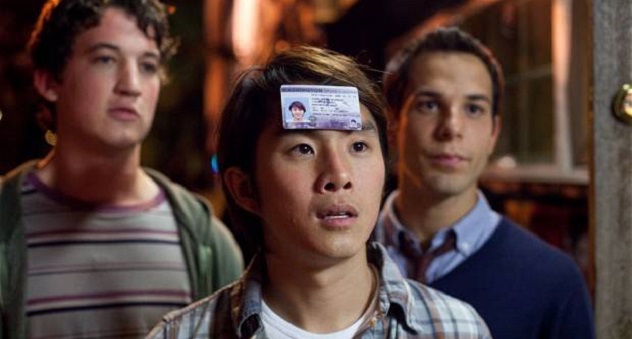
Landing in movie theaters in 2013, 21 and Over is a dime-a-dozen college comedy that follows three friends who jump from one comically debauched situation to another during a drunken night out. This celebration of youthful hedonism seemed an odd choice to be granted a Chinese release, and indeed, it wasn’t afforded a date without a major retooling of the film’s hazy message.
The American version of 21 and Over has the Chinese character, Chang, embrace individualism against the pressure of family expectations. However, the Chinese version featured extra scenes that show Chang leaving his Chinese campus and being corrupted by the West’s wayward ideals, all before returning to China a better person, ready to embrace his roots. Needless to say, these two versions deliver messages that are in direct opposition to each other.
To make matters even stranger, Relativity Media (21 and Over’s production company) was criticized by a prominent human rights group due to their choice of a particular shooting location. The added Chinese scenes were filmed in Linyi, a city located in the Shandong province that’s near the village of Dongshigu.
Dongshigu is the hometown of activist Chen Guangcheng, and it was effectively turned into a police state after Guangcheng was placed on house arrest after a four-year stint in prison. Guangcheng was imprisoned for bringing a landmark case against his local government for their illegal and brutal enforcement of China’s one-child policy. The house arrest was considered unlawful as Guangcheng was never charged with a second offense after serving his prison sentence.
Foreign and Chinese journalists that tried to visit the village were often violently herded away by Communist Party muscle. Human Rights Watch, a human rights group, issued a statement expressing concerns that Relativity Media’s decision to film in the Shandong province made the production company a willing prop in the Linyi propaganda machine. According to critics, this propaganda cast the city as a “civilized municipality that promotes culture when the reality is that it is not only holding one of China’s most prominent human rights defenders, but going to extraordinary lengths to persecute him.”
Relativity Media released a statement reaffirming their outspoken views against human rights abuses while simultaneously standing by their relationship with China. Fortunately, Guangcheng escaped from Dongshigu and eventually made it to America with his family. Without pausing for breath, the blind activist began studying law and writing his memoir. His English-language autobiography contained scathing criticisms of the Chinese government, but his opinions on raunchy teen comedies remain a mystery.
1 Transformers: Age Of Extinction
Made as an official co-production, Age of Extinction was made in conjunction with CCTV, China’s official state broadcaster, and Jiaflix, a company that specializes in organizing deals between Hollywood studios and Chinese investors.
CCTV exists as part of the powerful State Administration of Radio, Film, and Television, leading some to speculate that Age of Extinction was made to represent the Chinese government’s values. Scenes in the sci-fi epic depict the Chinese government as firm yet benevolent, while members of US government agencies look indecisive and corrupt. One scene shows an American official holding a gun to the head of the hero’s daughter in order to extract information.
Like all Michael Bay features, the plot is soon sidestepped in favor of explosions and product placement. In one puzzling scene, Jack Reynor’s character is seen sipping a Chinese Red Bull in Texas. Other familiar Chinese products pop up at inappropriate times throughout the movie.
All this branding was not without its share of complications. The Chongqing Wulong Karst Tourism Co., a company that manages a tourist hot spot in China, began legal proceedings against Age of Extinctions’s production company for failing to show a logo of the popular tourist destination in the film. But perhaps the legal headache was worth it as Age of Extinction grew to become one of the highest-grossing films ever released in China.
You can follow Ray on Twitter or subscribe to his occasionally updated YouTube channel.







